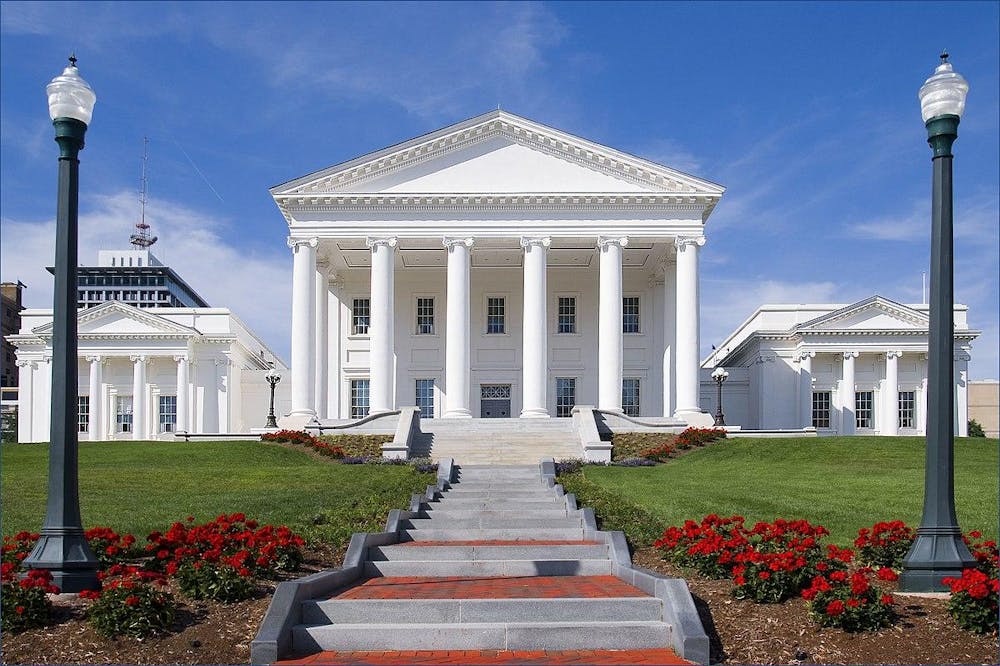Virginia Gov. Glenn Youngkin discussed Virginia’s accomplishments over the past two years — as well as challenges in education, healthcare and safety — in the State of the Commonwealth address last week. He called for reduced taxes, stricter penalties for drug-related offenses and increased investment in law enforcement.
The Governor said that Virginia has recently made economic progress, citing the growing working class as evidence of the state’s increasingly successful economy. Noting a surge of 233,000 additional Virginians employed today compared to two years ago, Youngkin said that the right to work was crucial in fostering economic growth.
“At the heart of opportunity and jobs is the fundamental right to work,” Youngkin said. “Please don’t bring me a bill that impacts Virginians’ Right to Work, as it will be met with the business end of my veto pen.”
Although he discussed Virginia’s economic achievements, such as success in providing a record $5 billion in tax relief, Youngkin mentioned plans for significant tax reform. In particular, Youngkin said he aims to cut total taxes by 12 percent, as well as eliminate the car tax, an annual tax levied on the value of personal vehicles. For low-income Virginians, Youngkin said that he will expand the earned income tax credit to alleviate financial burdens.
Youngkin also said he plans to advance the workforce in Virginia by expanding universal licensing and access to certifications for the working population. He added that he plans to ensure that every Virginia high school student can not only graduate with a diploma, but with credentials that improve their access to high-paying jobs. Youngkin’s Workforce Development Transformation legislation, which codified these changes, was passed with bipartisan support last February.
“Let’s spend our time advancing our great workforce … if we don’t build capacity right now, Virginia will not grow,” Youngkin said.
Youngkin also addressed a decline in K-12 public school enrollment, attributing setbacks in education to prolonged COVID-19 related school closures that he labeled unnecessary. He added that his "All In Virginia Plan" — a program offering intensive tutoring for 3rd to 8th graders who require extra learning support — has been successful. Additionally, Youngkin said he had proposed an education budget of $20.2 billion dollars for the next two years, the largest education budget in the history of the commonwealth.
Youngkin discussed the overcrowding of healthcare services, as well as emerging crises in the Virginia healthcare system at large. Youngkin said that 3,544 Virginians are waiting on the “Priority One” list, a list encompassing families waiting for Medicaid and disability healthcare coverage, and pledged to eliminate this backlog in 2024 through additional funding.
“We must ensure that these Virginians have meaningful living and care options, as well as other elements that meet the goals of the settlement,” Youngkin said.
Youngkin also spoke on the growing drug crisis in Virginia, stating that on average, five Virginians succumb to fentanyl poisoning every day. He called for stricter drug penalties and stronger support for law enforcement, calling for a bill that would raise the severity of selling or manufacturing illicit drugs that result in a person’s death from a class 6 felony charge to felony homicide.
“There is no doubt that the ramifications of addictive drugs and the infiltration of violent gangs is at an unprecedented level in our communities,” Youngkin said. “We know a majority of violence is related to drug and gang activity.”
Virginia lawmakers increased penalties for gang-related violence in July in an effort to reduce related crimes. Youngkin also said he plans to support law enforcement through his upcoming budget and uphold his commitment to “Operation Bold Blue Line,” a project that aims to encourage students to join law enforcement.
Stressing his commitment to law enforcement, Youngkin advocated for heightened security measures on college campuses. While discussing his concerns regarding campus safety and religious peace in Virginia communities, Youngkin expressed his support for Israel and urged the General Assembly to pass a bill preventing Virginia from engaging in business with companies that boycott Israel.
“Pass a hate crime bill which ensures all forms of antisemitism, not just religious bigotry, are treated as hate crimes under the law … Virginians should not worry about being the victim of a crime simply because of their religion, their race or creed,” Youngkin said.
The Virginia Democratic Party, which gained full control of the statehouse last November, issued a video response to Youngkin’s address, criticizing his tax reduction policies, pro-life position and opposition to gun reform. Senator Louise Lucas, president pro tempore of the senate and Virginia’s Senator for the 18th senate district, said that Youngkin’s policies do not promise a better future for all Virginians.
“This past November, voters made it clear across the commonwealth that they do not subscribe to the ideas of this Governor or that of the Republican party,” Lucas said.
Youngkin’s term will run until January 2026, when a new governor will be elected for the 2026-2030 term. Although Youngkin will be ineligible to run for immediate reelection, he could be reelected for future terms, per Virginia law.







